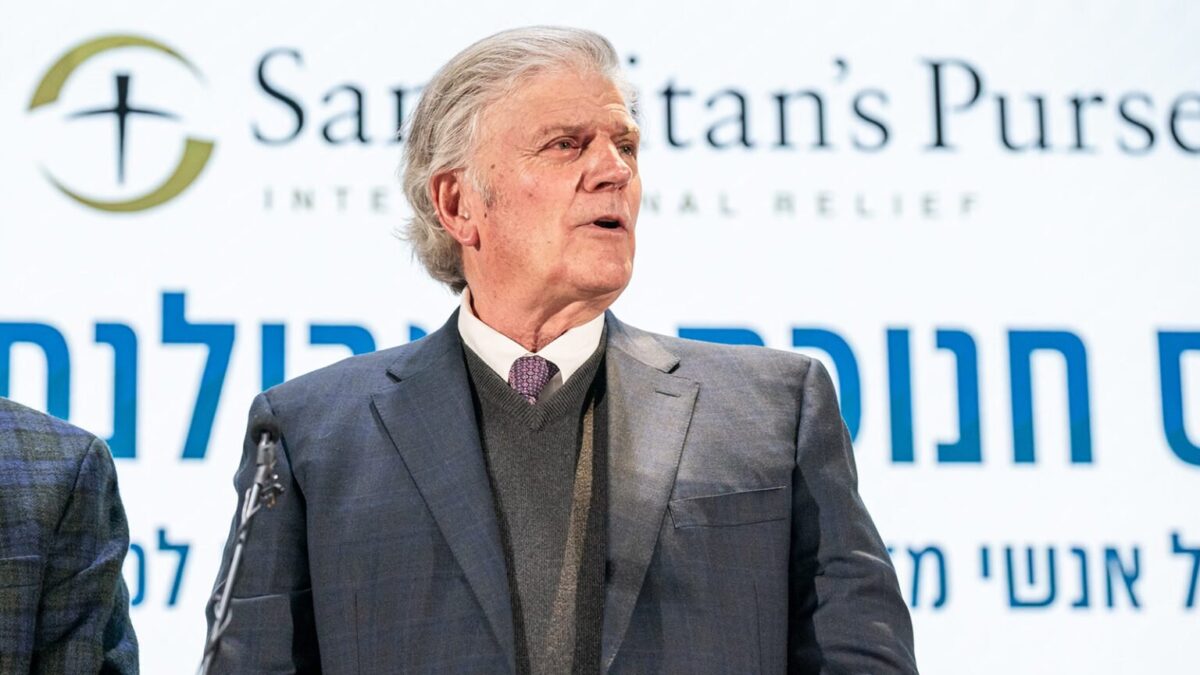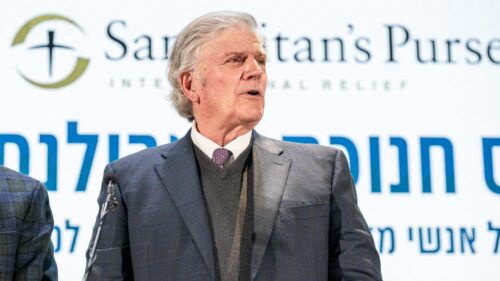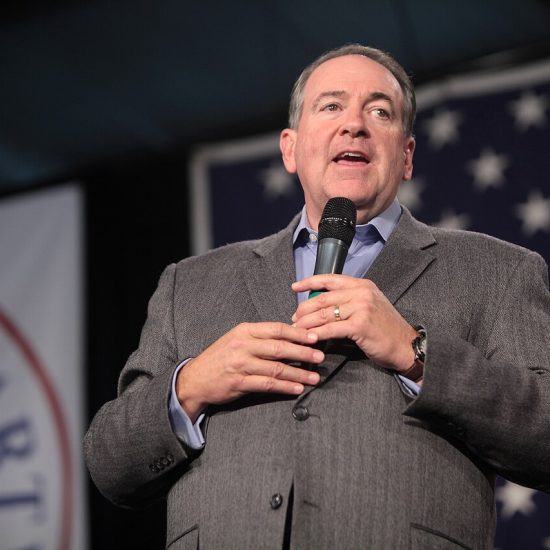
(RNS) — Franklin Graham, the president and CEO of two of the largest Christian ministries in the country, has quit his organizations’ membership in a financial accountability group that sets standards for evangelical nonprofits.
Graham, who leads Samaritan’s Purse and the Billy Graham Evangelistic Association, withdrew from the Evangelical Council for Financial Accountability over new standards the group had set for “leader care.”

Franklin Graham speaks in Israel on Jan. 23, 2024. (Photo courtesy of Samaritan’s Purse)
The ECFA, which requires member nonprofits to have audited financial statements and to make those public, among other things, recently announced it was adding leadership integrity requirements to prevent the kind of abuse and scandals that have rocked so many Christian leadership ranks.
Just in the past year, Texas megachurch founder Robert Morris pleaded guilty to child abuse, Dallas megachurch pastor Tony Evans stepped back from leading his church due to undisclosed “sin” and the Church of England’s Archbishop of Canterbury Justin Welby resigned over allegations that he failed to immediately report child abuse.
The new standard requires all ECFA member organizations to develop a care plan for their senior leader, one that would include regular communication with a board-led spiritual team and dedicated time for rest, retreats, and physicals.
In a letter to the ECFA’s president this past summer, Graham wrote that the new leader standards “puts ECFA into the role of trying to be the moral police of the evangelical world.”
“The Leader Care standard,” Graham wrote, “deals with personal spiritual maturity and behavior matters clearly outside the scope of ECFA’s expertise. While ECFA has proven to have expertise in matters of financial practices of nonprofit organizations, it does not offer its members expertise in developing ‘care plans’ for leaders.”
The withdrawal of Samaritan’s Purse and the Billy Graham Evangelistic Association represents the end of an era for the Graham family. Franklin Graham’s father, the late evangelist Billy Graham, was instrumental in founding the ECFA alongside the U.S. branch of World Vision, back in 1979.
The ECFA provides accreditation, or a seal of approval, to those organizations that adhere to its Seven Standards of Responsible Stewardship. Those standards — maintaining a board with a majority of independent members, not compensating fundraisers on a percentage of money raised — are sought after by many of the leading Christian nonprofits — 2,700 in total. Members include the Salvation Army, the American Association of Christian Schools, Cru, Young Life, and a host of large megachurches.
The new “leader care” standards were endorsed by the presidents of the National Association of Evangelicals and the Council for Christian Colleges and Universities in addition to a raft of other nonprofit organizations and churches.
They will become a requirement for accreditation beginning Jan. 1, 2027.
“While we are disappointed that the leaders of BGEA and Samaritan’s Purse have decided to withdraw from ECFA, we honor their legacy,” ECFA President and CEO Michael Martin said in a statement. “We wish them well as they continue to pursue their missions.”
Neither Martin nor Graham was available for interviews.
Samaritan’s Purse, the humanitarian disaster relief organization based in Boone, North Carolina, posted net assets of $1.4 billion in a publicly available audit last year. The BGEA no longer files an IRS Form 990, a public statement of its financial information, since it changed its tax status from a nonprofit to an “association of churches” in 2016. According to the MinistryWatch database, the BGEA, based in Charlotte, North Carolina, had annual revenue exceeding $224 million.
Mark DeMoss, a former PR executive, now retired, who represented Franklin Graham in the past, wrote an independent analysis of the new standards for the president of the ECFA last year, concluding that the leader care standard will not achieve its desired result.
DeMoss said he “wholeheartedly” agreed that a leader’s integrity is vital to an organization’s trustworthiness.” But he cautioned that the compliance standard was perfunctory and would not prevent moral failings among ministry leaders.
“The introduction of this Standard will set an expectation that can never be met,” DeMoss wrote. “No standard, particularly one as decidedly vague as this one, can prevent bad behavior.”
Theologian Scot McKnight, who has written about leadership, said he favored leadership standards in theory but said a care team should consist of trained spiritual directors, not board members.
“Evaluation of a living, spiritual dynamic needs to be done by a trained spiritual director, not board members who are often chosen by the senior leader and are often mesmerized by the senior leader,” McKnight wrote in an email. “Spiritual evaluation requires training and spiritual discernment.”
Jake Lapp, vice president of member accountability, said in an email that the ECFA’s 2025 membership retention rate is 97% and that 140 nonprofits and churches have submitted new applications for ECFA membership so far this year.






